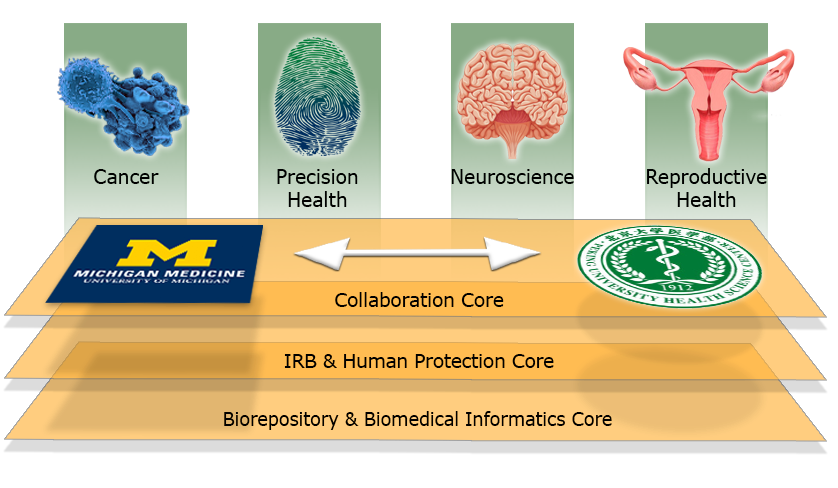Most JI research projects fall under one of four thematic areas, selected because of their potential for broad impact and mutual expertise across both partner institutions. Projects in other fields are considered, but these areas are emphasized:
- Cancer
- Precision Health
- Neuroscience
- Reproductive Health
Supporting each Program at the heart of the Joint Institute is an organizational structure that fosters the relationship-building, collaboration, and innovation necessary for success of the individual research teams. Three “Core” groups (Collaboration; IRB and Human Protection; and Biorepository and Biomedical Informatics), each with representatives from both partner institutions, provide the JI’s primary administrative framework, helping the individual research teams overcome specific challenges and issues associated with complex international collaborations. In addition to the technological infrastructure and administrative assistance needed for success, the Cores provide joint oversight to ensure the work adheres to established standards and practices for research involving human subjects and tissue.
Collaboration Core
Institutional Review Board & Human Protection Core
The central mission of the Joint Institute’s Institutional Review Board (IRB) and Human Protection Core is to promote the protection of human participants in the research being conducted by the Joint Institute. The Board comprises representatives from the internal IRBs of both universities. Through careful review and monitoring of Joint Institute Programs and proposals, the Board works to ensure that research activities adhere to all applicable laws, regulations, and institutional policies for research involving human subjects. The Joint Institute IRB serves as liaison to the Michigan Medicine IRBMED and the PKUHSC IRB ensuring that all collaborations meet the human protection standards in place at both universities.
Leads
Biorepository/Biomedical Informatics Core
The Biorepository and Biomedical Informatics (BRBI) Core is responsible for establishing standardized procedures for the acquisition, storage, and management of biospecimens and data that support the Joint Institute’s research missions. The BRBI Core provides a robust electronic data capture infrastructure to support field data entry and sharing and long-term management of the data. It also strives to provide project management support such as patient consent and sample tracking, allowing investigator teams to focus on their core research tasks. All Joint Institute programs and investigators are required to follow the standards established by this core.
Leads









